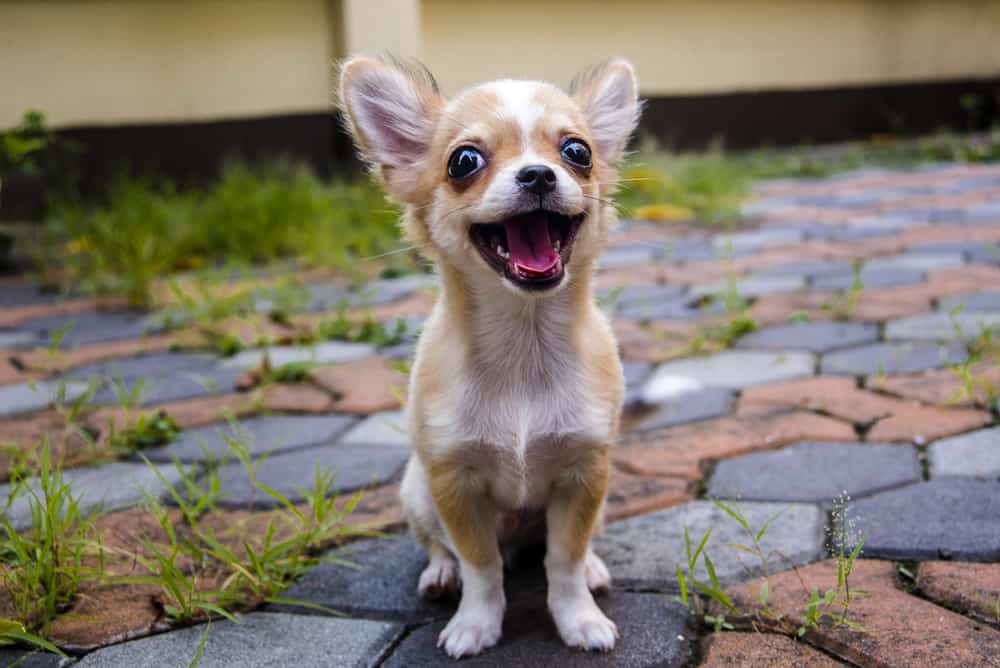Chihuahuas have a rich history as one of only two dog breeds in the world which can trace its lineage back beyond the European colonisation of the Americas. One of the smallest dog breeds, Chihuahuas take their name from the northern Mexican state of Chihuahua, but their popularity was known all throughout the Mexican peninsula during the time of the Aztecs, Toltecs and Olmecs.
In fact, as unpalatable as it might seem to you and me – dog lovers and Chihuahua owners – evidence would suggest that these tiny little pups were bred and reared as livestock by the ancient inhabitants of Central America (i.e. for eating!).
Thankfully, these days Chihuahuas are beloved pets with adoring owners who just want the best for them. They are funny little companions, with a mean yap and the disposition of a much bigger beast. Standing around just 5″ tall, Chihuahuas are known to be fiercely loyal and territorial – a better guard dog than many larger breeds!
In this article, we’ll walk you through exactly how to look after your loveable pooch in the best way possible. We’ll look at the foods Chihuahuas need in their diet, as well as the food to avoid, in addition to discussing how much, and how often, you should feed your dog. Finally, we’ll dispense some all important tips on how to care for your Chihuahua’s particular health conditions.
What do Chihuahuas like to eat?
It may come as no surprise to you that Chihuahuas are picky eaters. Unlike other breeds, such as Labradors, who will scoff at pretty much anything you put in front of them, Chihuahuas have evolved to be much more choosey about what they put in their bodies.
This, of course, makes perfect sense. Chihuahuas are tiny, and so they have to be careful about what they put into their bodies, as every single gram will affect them. Whereas a big Labrador could potentially eat something that disagreed with them and pass it without knowing, a Chihuahua could eat the same thing and become quite ill.
Thus, let’s look at what Chihuahuas like to eat, and which ingredients comprise a full, rounded, healthy nutrition for this pocket-sized pooch we all love so much.
Protein
Small as they may be, Chihuahuas are still dogs, and dogs are close relatives of wolves! The most important part of any dog’s diet is protein, which can most readily be attained through the consumption of meat. Dogs can eat any meat, but it’s especially important when feeding Chihuahuas to ensure that you’re giving them the best quality meat you can afford.
Here’s a list of the types of protein Chihuahuas love best:
- Chicken
- Beef
- Fish
- Salmon
- Lamb
- Turkey
Many owners choose to cook their Chihuahuas meat at home, rather than feeding them meat out of the can. However, one thing you need to be extra careful about if doing so, is to remove any and all bones before giving the meat to your pup.
Chihuahuas have soft, sensitive teeth which are not well-equipped to crunch and process bones, and so bones could actually hurt your Chihuahua if left in the food.
If you don’t have the time or energy to cook fresh food for your pooch (and let’s face it, few of us do), then try picking a kibble with at least 40% meat content to get them the protein they need.
Fruit and Vegetables
Dogs would, if they could, exist solely on meat. However, vegetables – as they are for humans – still comprise an important part of a Chihuahua’s healthy diet. Fruit and veg provide the sort of minerals, nutrients and all-important vitamins that Chihuahuas depend on to stay healthy and happy. Vegetables are also high in fiber, which can benefit the sensitive tummies Chihuahuas are prone to.
Here’s a list of the types of fruit and vegetables which are best for Chihuahuas:
- Broccoli
- Carrots
- Peas
- Leafy Greens
- Raspberries
- Apples
- Bananas
- Watermelon
- Corn
Note that Chihuahuas will let you know what they do and don’t like the taste of (yep, they’re that picky!) so it may take you a bit of trial-and-error to determine which fruit and veg they’re most partial to. Try, as with meat, to feed your Chihuahua a diet comprised of around 40% fruit and veg.
Complex Carbohydrates
Complex carbohydrates and carbohydrates which take longer to break down and enter the bloodstream. They’re good for us because they provide a source of slow-release energy, rather than releasing their energy and sugars all at once, causing a spike in blood sugar levels which can contribute to diabetes. The same goes for Chihuahuas.
Introducing some complex carbs into your pet dog’s diet can help to ensure their energy levels are kept constant and manageable throughout the day. Chihuahuas can be supremely spritely dogs, so you don’t want to feed them anything that packs an energy punch all at once.
Two particularly excellent sources of complex carbohydrates are:
- Sweet Potatoes
- Pumpkin
We would recommend you avoid feeding your chihuahua regular potatoes, as doing so provides them little benefit, but may contribute toward Chihuahua obesity.
Fatty Acids
Fatty acids (Omega-3 and Omega-6, for example) help to promote healthy skin and hair in both humans and animals. Too much of them isn’t hugely beneficial, but a little in your Chihuahua’s diet can help to offset against the chances of them developing skin conditions or suffering from excessive hair loss, as Chihuahuas are unfortunately prone to.
Wet vs. Dry Food
Chihuahuas tend to suffer from periodontitis (gum disease) which can include symptoms such as bad breath (gingivitis) and plaque build-up. Whilst in other dogs dental treats can go a long way to preventing periodontitis, unfortunately a study by the University of Vet Sciences in the Czech Republic found that these have little effect in Chihuahuas.
Instead, one of the best things you can do for toy gods is to feed them dry food, or kibble. Chewing dry food helps to keep Chihuahuas’ teeth healthy, whilst the coarseness of the food scrapes plaque from the teeth at the same time.
On the contrary, wet food does nothing in the way of preventing periodontal health disorders, and can typically contain much higher fat content than dry food, leading in turn to symptoms of doggy obesity.
Small vs. Large Kibble
Small dogs need small food – it’s really as simple as that. Kibble that’s too large may be difficult for your pet to process, perhaps even leading to choking accidents if you’re not careful. Thus, we recommend always opting for a smaller kibble size when buying for your Chihuahua, in order to ensure that they can chew their chow comfortably and without difficulty.
What foods should Chihuahuas not eat?
As important as it is to know what to feed your Chihuahua, it’s equally crucial that you know what to avoid feeding her/him. Some foods are simply not healthy for Chihuahuas, and can lead to excessive weight or other dietary issues, whilst other foods are potentially lethal if ingested.
If you think that your Chihuahua may have ingested any of the foods on the below lists, contact a vet immediately to ask for their professional veterinary advice.
Toxic Ingredients
The following ingredients are toxic to most dogs, but especially to Chihuahuas (given their small breed size, the active compounds in these lethal foods will work quicker and stronger in Chihuahuas’ bloodstreams).
- Garlic
- Onions
- Leeks
- Chives
- Wild mushrooms
- Grapes
- Raisins
- Seeds
- Nuts (especially Macadamia nuts)
- Chocolate
- Xylitol
Garlic and onions are highly toxic to dogs and even small amounts can cause serious health issues. Grapes and raisins are the same, causing kidney failure in the most serious of cases.
Seeds contain trace amounts of cyanide which, whilst safe for humans and larger dogs in small quantities, can be immediately fatal to Chihuahuas (you should always remove seeds from fruit before feeding it to your dog).
Chocolate (which contains theobromine and caffeine) and xylitol (a common ingredient used as a sugar-substitute in many candies) are equally toxic, and potentially fatal, to small pooches.
Unhealthy Ingredients
Whilst not necessarily fatal, there are also a number of ingredients you should try your best to avoid feeding your Chihuahua. We’re referring to unnecessary additional fillers and preservatives which cheaper dog food formulas tend to include simply to bulk them out. Other unhealthy ingredients are ones which offer little in the way of nutrition to Chihuahuas, and may contribute to obesity and/or diarrhea, vomiting, and diabetes.
- Dairy (milk, cream, cheese)
- Corn
- Wheat
- Soy
- Corn syrup
- Dyes
How much should you feed your pet chihuahua each day?
Chihuahuas, being as small as they are, funnily enough don’t require all that much feeding. However, they’re food intake can require greater regulation and maintenance than in other dogs less prone to dietary problems.
How much you should feed your Chihuahua per day depends on a few different factors:
- Age (Chihuahuas’ puppies require more calories than adult Chihuahuas)
- Weight
- Exercise levels
Generally speaking, the rule is that Chihuahua puppies should eat 50 calories per pound of weight per day, whilst adult, fully-grown Chihuahuas should eat just 35-40 calories per pound per day. All-in-all, adult Chihuahuas tend to eat somewhere between 120-200 calories per day.
You’ll have to calculate how much food this equates to based on the per gram calorie content of the puppy food you’ve chosen to feed your pet pup.
How often should you feed a chihuahua?
Most experts tend to agree: because Chihuahuas have smaller stomachs and faster metabolisms than their larger cousins, they should be fed more frequently: 3-5 meals throughout the day. Spreading their food out like this throughout the day ensures they keep their energy levels up, and don’t develop lethargy or digestive ailments.
Top 5 Tips on How to Care for a Pet Chihuahua
Invest in your dog’s food
Times are tough for everyone right now, and the cost of living crisis means pet owners around the world are turning to cheaper alternatives to feed their beloved animals. Unfortunately, cheap food can have dire consequences for Chihuahuas, who are so particular when it comes to diet and dietary health.
If you can, we strongly suggest that your biggest investment when it comes to your pet dog should be in high-quality food. Forgo the toys, the fancy dog bed, the diamanté-encrusted collar, and instead opt for some vet-approved, high-quality food for your Chihuahua.
Thankfully, since they’re so small, and consume so little, it’s much cheaper to feed a Chihuahua quality kibble than it is to feed a larger dog the same.
Brush your Chihuahua’s teeth
As we mentioned before, Chihuahuas have sensitive teeth which can be prone to periodontal problems. That same study we quoted before found that the best way to keep your Chihuahua’s teeth healthy is simply to brush them yourself, using a doggy-friendly toothbrush.
Monitor your pet’s eating habits
Chihuahuas, unlike other dogs, are genuinely picky eaters, meaning that they will reject certain foods they don’t like the taste of. What makes this more difficult to deal with is the fact that not all Chihuahuas like and dislike the same food. As such, you should closely monitor your pet Chihuahua’s eating habits until you’ve determined which foods they’re most fond of, and which ones they’re less likely to touch.
Groom your pet Chihuahua regularly
Chihuahuas can sometimes exhibit symptoms of skin disease, including hair loss. To aid Chihuahuas in this department, we recommend grooming them regularly.
Make sure your pup gets the right amount of exercise
Last, but most certainly not least, make sure that you give your puppy the right amount of exercise. Chihuahuas may not be big, bulky Huskies evolved to pull sleds across the Siberian tundra, but they still pack a lot of energy into that tiny body of theirs.
Chihuahuas have long life expectancies – somewhere in the region of 15 years on average – which means they are more likely to exhibit hereditary and lifespan issues. You can help to alleviate these symptoms, and avoid them altogether, by keeping your Chihuahua active into old age.
Conclusion
Chihuahuas can be picky eaters, but feeding them a healthy balanced diet of the high-quality proteins found in meat, and the vitamins, nutrients and minerals found in fruit and vegetables, is all you really need to remember in order to keep your best friend in tip-top condition.



